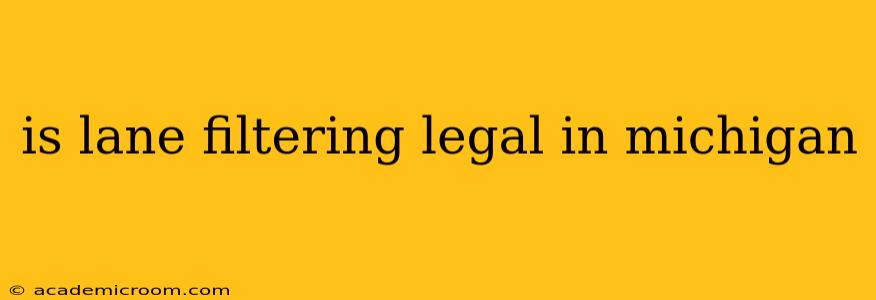Lane filtering, also known as lane splitting, is the practice of a motorcycle riding between lanes of stopped or slow-moving traffic. The legality of this practice varies widely across states, and Michigan is no exception. The short answer is no, lane filtering is not explicitly legal in Michigan. However, the situation is more nuanced than a simple yes or no.
What Does Michigan Law Say About Lane Filtering?
Michigan's motor vehicle laws don't directly address lane filtering. There's no statute explicitly permitting or prohibiting it. This lack of specific legislation leaves the legality of lane filtering open to interpretation by law enforcement and the courts. In practice, this means that officers can choose to cite a motorcyclist for various traffic infractions, depending on the specific circumstances of the situation.
What Offenses Could a Motorcyclist Face While Lane Filtering in Michigan?
Even without a specific law against lane filtering, several existing traffic laws could be applied if a motorcyclist is deemed to be operating unsafely while filtering between lanes. These may include:
- Reckless driving: This is a serious offense that applies to driving behavior that shows a blatant disregard for the safety of others. Lane filtering, if performed recklessly or at excessive speeds, could easily fall under this category.
- Careless driving: A less serious offense than reckless driving, but still carries penalties. It could be applied if a motorcyclist filters lanes in a manner that's deemed careless or inattentive to other drivers.
- Impeding traffic: If a motorcyclist's lane filtering action obstructs or interferes with the flow of traffic, they could be cited for impeding traffic.
- Violation of other traffic laws: Depending on the specific circumstances, a motorcyclist could also be cited for other violations such as speeding, following too closely, or failing to signal.
Is Lane Filtering Ever Safe?
The safety of lane filtering is a hotly debated topic. Proponents argue that it can reduce congestion and improve rider safety by allowing motorcycles to avoid being rear-ended in slow-moving traffic. Opponents, however, highlight the increased risk of collisions with other vehicles, especially those who may not anticipate a motorcycle weaving through lanes.
Ultimately, the safety of lane filtering depends heavily on factors such as:
- Traffic speed and density: Lane filtering is generally considered safer in slow-moving traffic with sufficient gaps between vehicles.
- Rider skill and experience: Experienced and skilled riders are better equipped to handle the challenges and risks of lane filtering.
- Visibility and weather conditions: Poor visibility or adverse weather conditions significantly increase the risks associated with lane filtering.
What if a Police Officer Pulls Me Over for Lane Filtering in Michigan?
If stopped for lane filtering, it's crucial to remain calm and respectful. Cooperate with the officer and explain the situation clearly and concisely. Depending on the officer's judgment and the specific circumstances, you might receive a warning, a citation, or even an arrest. It's wise to know your rights and consider seeking legal counsel if you receive a citation.
Frequently Asked Questions (FAQ)
Is lane splitting legal anywhere in the US?
While not explicitly legal in most states, California is a notable exception. California has specific laws allowing lane splitting under certain conditions.
What are the potential consequences of lane filtering in Michigan?
Potential consequences range from warnings to citations for reckless driving, careless driving, impeding traffic, or other traffic violations.
Is it safer to lane filter than to sit in stopped traffic?
The safety of lane filtering compared to sitting in stopped traffic is highly debated and depends heavily on many factors, including rider skill, traffic conditions, and weather.
In conclusion, while not explicitly prohibited, lane filtering in Michigan carries significant risk and uncertainty. Motorcyclists should exercise extreme caution and consider the potential legal and safety implications before attempting this maneuver. The best course of action is to avoid lane filtering altogether in Michigan to prevent potential legal issues and ensure personal safety.
